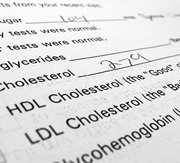< Return to trials
Hyperlipidemia (High Cholesterol)

Trial Overview
We are currently recruiting participants for multiple high cholesterol trials. Our newest trial is for individuals who are are between 18-75 years of age who do not take medication for high cholesterol and have elevated LDL levels.
If you are unsure where your cholesterol levels are at, visit our office for a free cholesterol check and to see if you are eligible to participate. There are no overnight visits, we offer flexibility in scheduling your clinic appointments and you are compensated for your time.
Definition
Cholesterol is a waxy, fat-like substance made in the liver and other cells and found in certain foods, such as food from animals, like dairy products, eggs, and meat. When too much cholesterol is present, plaque (a thick, hard deposit) may form in the body's arteries narrowing the space for blood to flow to the heart. Over time, this buildup causes atherosclerosis (hardening of the arteries) which can lead to heart disease.
Description
The body needs some cholesterol in order to function properly. Its cell walls, or membranes, need cholesterol in order to produce hormones, vitamin D, and the bile acids that help to digest fat. But the body needs only a limited amount of cholesterol to meet its needs. Cholesterol travels through the blood attached to a protein -- this cholesterol-protein package is called a lipoprotein. Lipoproteins are classified as high density(HDL), low density(LDL), or very low density(VLDL), depending on how much protein there is in relation to fat. LDL cholesterol can build up on the walls of your arteries and increase your chances of getting heart disease. That is why LDL cholesterol is referred to as "bad" cholesterol. The lower your LDL cholesterol number, the lower your risk. If you have heart disease or blood vessel disease, some experts recommend that you should try to get your LDL cholesterol below 70. For people with diabetes or other multiple risk factors for heart disease, the treatment goal is to reach an LDL of less than 100, although some physicians will be more aggressive. When it comes to HDL cholesterol -- "good" cholesterol -- the higher the number, the lower your risk. This is because HDL cholesterol protects against heart disease by taking the "bad" cholesterol out of your blood and keeping it from building up in your arteries.
Causes and Symptoms
A variety of factors can affect cholesterol levels.
They include:
Poor Diet. Saturated fat and cholesterol in the food you eat increase cholesterol levels. Try to reduce the amount of saturated fat and cholesterol in your diet.
Weight. In addition to being a risk factor for heart disease, being overweight can also increase cholesterol. Losing weight can help lower your LDL and total cholesterol levels, as well as increase HDL cholesterol.
Exercise. Regular exercise can lower LDL cholesterol and raise HDL cholesterol. You should try to be physically active for at least 30 minutes on most days.
Age and Gender. As we get older, cholesterol levels rise. Before menopause, women tend to have lower total cholesterol levels than men of the same age. After menopause, however, women's LDL levels tend to rise.
Diabetes. Poorly controlled diabetes increases cholesterol levels. With improvements in control, cholesterol levels can fall.
Heredity. Your genes partly determine how much cholesterol the body makes. High blood cholesterol can run in families.
Other causes. Certain medications and medical conditions can cause high cholesterol.
High Cholesterol has no symptoms and the only way to detect it is from a blood test.
Source
http://www.mayoclinic.org/diseases-conditions/high-blood-cholesterol/home/ovc-20181871
If you have been diagnosed with high cholesterol or are interested in finding out where your numbers are at, contact us today to learn more about our current study opportunities for this diagnosis.
Call us at (701) 232-7705 or toll-free at (866) 532-7705
Signup online or email our recruiter at recruiter(at)lillestolresearch(dot)com.
Your information is always kept confidential.